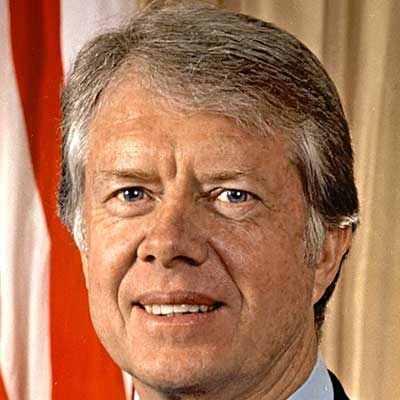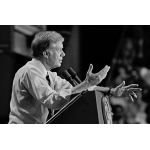Carter, Jimmy
Fatemeh Daftari
209 بازدید
James Earl Carter (1924) was the 39th President of the United States, whose presidency coincided with the victory of the Islamic Revolution in Iran and the beginning of Iraq's imposed war against Iran.
Jimmy Carter was born in 1924 in Plains, Georgia. He studied physics and later joined the Navy. In 1962, he was elected as a senator for the state of Georgia. In 1976, representing the Democratic Party, he became the President of the United States, a position he held until 1981.[1]
Carter prioritized defending Iran during the Pahlavi era and considered it important for the United States.[2] For this reason, he attempted to strengthen Iran's military bases. On May 12, 1977, U.S. Secretary of State Cyrus Vance traveled to Tehran and announced Carter’s agreement to Mohammad Reza Shah's request for the sale of 160 F-16 aircraft.[3] Despite opposition from 20 U.S. senators, Carter also approved the sale of seven AWACS radar planes to Iran, emphasizing that helping Iran meant helping the United States.[4]
However, Carter’s Iran-friendly policy came to an end with the victory of the Islamic Revolution. In response, the United States froze more than $8 billion of Iranian assets, including cash and gold held in U.S.[5] banks. Through Executive Order 12710, Carter also banned oil imports from Iran, blocked Iranian properties and assets in the United States, closed Iranian bank accounts, and prohibited U.S. dollar exchanges with Iranian banks.[6]
On November 4, 1979, in protest of U.S. actions against Iran and the refusal to extradite Mohammad Reza Shah Pahlavi, whom Iranian officials demanded for trial,[7] students aligned with Imam Khomeini’s movement seized the U.S. Embassy in Tehran and detained its staff.[8] In a speech on November 11, 1979, Imam Khomeini addressed Carter, saying: "Carter, don’t scare us with war. We are warriors. We prefer our dignity with hunger over submission."[9]
As tensions between Iran and the U.S. escalated, political relations between the two nations were officially severed on April 9, 1980.[10] The seizure of the U.S. Embassy became a major scandal for Carter, who made several attempts to resolve the crisis and rescue the hostages. These efforts, including a military operation in the Tabas Desert in May 1980, which had failed.[11]
When the Iraq-Iran war began in September 1980, Carter hoped it would facilitate the release of the American hostages.[12] However, he also recognized the war as a significant threat to regional peace and stability.[13] In a speech on October 2nd , 1980, Carter stated that the United States had two goals during the Iran-Iraq crisis: to push the two countries towards negotiations and to prevent Soviet interference in the conflict.[14]
Although Carter claimed neutrality in the conflict between Iran and Iraq,[15] on October 7, 1980, he expressed that if mediation efforts failed, the U.S. should side with Iraq and offer them both material and moral support.[16] In alignment with these statements, Carter imposed an embargo on selling arms and equipment to Iran, while simultaneously supplying military aid to Iraq, strengthening its military capabilities.[17] This created numerous difficulties for Iran in securing necessary supplies during the war.[18]
Carter’s rival in the 1980 U.S. presidential election, Ronald Reagan, criticized Carter’s foreign policy in the Middle East, claiming that the Iran-Iraq war resulted from Carter’s lack of firmness in foreign policy and the weakness of U.S. defense capabilities.[19] On November 4, 1980, Reagan defeated Carter in the presidential election.[20]
Years later, despite his involvement in escalating the Iran-Iraq war, Carter criticized Reagan’s policies in the Persian Gulf in a speech on October 19, 1987.[21] After stepping down from politics during the 12-year Republican rule (eight years of Reagan’s presidency and four years under George H. W. Bush), Carter returned to public life with the election of Democrat Bill Clinton. He played a significant role in resolving international crises, including the North Korean nuclear issue and the Haitian crisis.[22]
[1] Danesh Gostar Encyclopedia, Vol. 12, Tehran: Danesh Gostar Rooz Scientific and Cultural Institute, 2010, p. 546.
[2] Tayrani, Behrouz, Daily Diary of Iran-US Relations, Tehran: Center for Diplomatic Documents and History, 1990, p. 245.
[3] Ibid., pp. 241 and 242.
[4] Ibid., pp. 245 and 246
[5] Ibid., p. 295
[6] Vaezi, Hassan, Iran and America, Tehran: Soroush, 2002, p. 126; Moussavian, Seyed Hossein, Iran and America, Tehran: Tisa, 2014, p. 83.
[7] Tayrani, Behrouz, Daily Diary of Iran-US Relations, p. 294.
[8] Toloei, Mahmoud, One Hundred Years, One Hundred Faces (Illustrated History of the Twentieth Century), Tehran: Alam Publishing, 1999, p. 1023.
[9] Tayrani, Behrouz, Daily Diary of Iran-US Relations, p. 295
[10] Toloei, Mahmoud, One Hundred Years, One Hundred Faces, p. 1025.
[11] Carter, Jimmy, Iran in the Memoirs of Jimmy Carter, translators: Ebrahim Irannejad and Tayyebeh Ghaffari, Tehran: Islamic Revolution Documents Center, 2011, p. 154.
[12] Iran-Iraq War Calendar, Vol. 4, Tehran: Center for War Studies and Research, Vol. 2, 1996, p. 84.
[13] Ibid., p. 124.
[14] Ibid., pp. 278 and 279.
[15] Ibid., p. 84.
[16] Ibid., p. 344
[17] Hosseini, Seyyed Yaqoob, Military History of the Imposed War, Backgrounds to the War, Vol. 1, Tehran: Publications of the Political Ideological Organization of the Army of the Islamic Republic of Iran, 2008, p. 298.
[18] Ibid., p. 342
[19] Iran-Iraq War Calendar, Vol. 4, pp. 164 and 165.
[20] Toloui, Mahmoud, One Hundred Years, One Hundred Faces, p. 1025
[21] Tayrani, Behrouz, Daily diary of Iran-US Relations, p. 337.
[22] Sajedi, Ahmad, Political Celebrities of the Twentieth Century, Tehran: Mihrab Qalam, 1995, p. 328.




